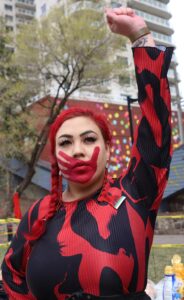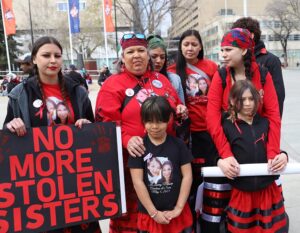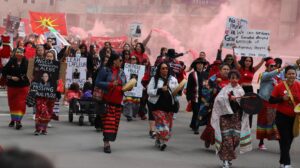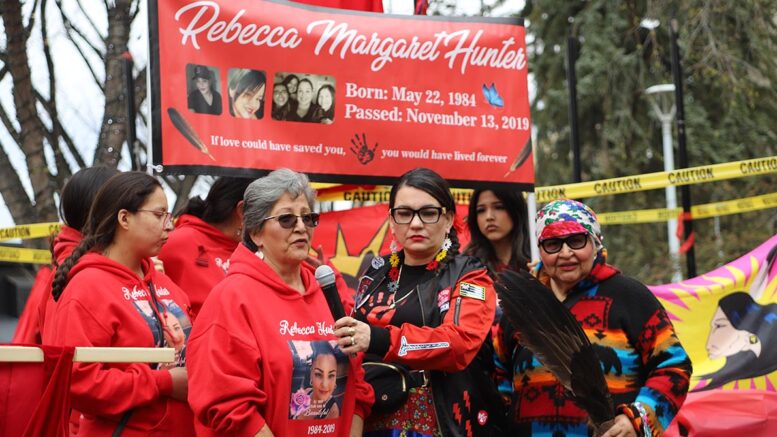By Terry Lusty, Local Journalism Initiative Reporter
(ANNews) – They came by the score to remember and honour missing and murdered relatives and friends. Their journey is filled with grief, anguish, and anxiety and their quest for healing, closure and justice is a never-ending nightmare.
Such was the setting in downtown Edmonton at Churchill Square on Saturday, May 5th, National Red Dress Day. By 12 noon, a crowd of 100 or more had exploded to several hundred, and then a thousand! Dozens upon dozens brandished posters, signs, and pictures of lost loved ones who met their end by way of murder, violence, or unknown causes. Many more are simply missing.

Red Dress Day in Edmonton last month. Photo by Terry Lusty.
Throughout Canada, similar gatherings were transpiring. Most of the event organizers are women wanting to share their stories, create awareness and seek closure and justice so they can get on with their ever-elusive healing journey.
Like the ‘Every Child Matters’ movement, this event continues to gain momentum as affected family members refuse to let go, are determined to locate their family members and friends, and are committed to finding justice and peace of mind.
It is a demonstration of pain, love, advocacy, and resilience.
At noon, everyone in attendance began a scheduled walk to Beaver Hills House Park, several blocks away. Led by several female drummers, participants sang all the way to the park area but paused briefly at a halfway point and conducted an impromptu Round Dance in the middle of Jasper Avenue. Joining the walk was Edmonton’s mayor, Amarjeet Sohi and a few council members.
Upon arrival at the park, they chanted the Women’s Warrior Song, then refreshed themselves with coffee, tea, water and light snacks before proceeding with the afternoon agenda of speakers – all individuals who have been impacted by the loss of dear ones.
This year, as in previous years, the heaviness was present. So was the sorrow, the pain and trauma, and the anxiety experienced and expressed by brothers, sisters, parents and relatives and friends of the missing and murdered.
Admittedly, it is a continuing saga that simply refuses to go away. Regardless of the awareness and attention given to this Canada-wide tragedy there appears to be very little progress in adequately dealing with the issue as the numbers of missing and murdered just keep on increasing.

Commemorating missing and murdered Indigenous
people in Edmonton on May 5, Red Dress Day. Photo by Terry Lusty.
Statistics show that in Canada, Indigenous people are twelve times more likely than non-Indigenous people to fall victim to murder or to go missing. Although they constitute four to five percent of Canada’s female population, they account for 23 percent of Canada’s murdered or missing people (using figures from 2014 and 2018). Between 1980 and 2012, according to RCMP figures, the number of missing and murdered is 1,181 females. Canada’s Parliamentary Secretary for Gender and Equality, Kelli Paddon, claims that 409 Indigenous women and girls were victims of homicide in Canada between 2009 and 2021. British Columbia and Manitoba have the highest rates for missing individuals which number 258 and 152 per 100,000 respectively.
That said, there are many people who say that these numbers are only in reference to “known” cases and that the real numbers are likely a great deal higher.
Once the Red Dress walkers settled in at the park, those carrying posters and pictures of loved ones set them up on the grass, along a brick-paved walkway at the north side of the patio area. Visitors strolled among the posters and chatted with some of the relatives in attendance.
One by one, individuals and family groups addressed the audience to express themselves and talk about their victimized family members or friends. This portion of the day’s activity was difficult – not just for the impacted families but for the supportive walkers who were there to lend strength and love for the lost and their relatives. To share in the grief and worry for the victims.

Red Dress Day March in Edmonton on May 5, 2024. Photo by Terry Lusty.
Lisa Big John, who lost her sister on Vancouver’s notorious East Hastings Street was raging as she told of knowing “how it is to have your life ripped apart.” She was also highly critical of the child welfare system in addition to failures in the justice system.
Donna Robillard, surrounded by several family members, poured her heart out over the loss of a daughter a year ago. With her moving words, she demonstrated an incredible amount of inner strength.
Then there was Cindy, a sister of the late Georgina Papin who was a murder victim of one of Canada’s worst serial killers, Robert Pickton. He was the pig farmer responsible for what is believed to be at least 49 female deaths. Cindy concluded her talk about the ongoing love she carries for her late sister and stated, “We (women) are not weak, we’re strong!”
Attention was also drawn to the fact that Pickton was at the time applying for day parole. He has since died from a fatal blow that he received while incarserated. He had been arrested in February of 2002 and convicted in 2007 of murder 2 in the killing of six of the 49 women that he is believed to have killed. Many people were upset that authorities would even dare to hear a request for his early parole. There were mixed feelings surrounded his sudden death. Most of the families were relieved that he would never see the light of day but others were upset that there would never be answers for so many victims. Also there is still a question as to whether Pickton acted alone or had one or more accomplices.
Red Dress Day is commemorated annually in Canada on May 5, the National Day of Awareness for Missing and Murdered Indigenous Women and Girls and 2SLGBTQI+ people. The origin of the symbolic red dress is attributed to Metis artist Jaime Black. He began hanging the red dresses in Winnipeg in 2010 to signify the violence inflicted upon Indigenous women and people. To most people it represents the pain and loss felt by loved ones and survivors.
The acronym MMIWG was coined by the Cree journalist Sheila North Wilson in 2012 when she worked for the Assembly of Manitoba Chiefs.
In Edmonton at Beaver Hills House Park, the crowd began to disperse on May 5 by 3 pm. The organizers and participants will continue to raise awareness and advocate for justice for their lost loved ones. And we will continue to share their pain and their love.



Be the first to comment on "Lost loved ones remembered, cherished on Red Dress Day in Edmonton"